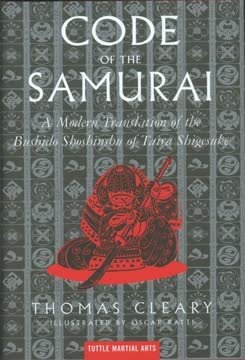Key Takeaways
1. Embrace Death to Live Fully
One who is supposed to be a warrior considers it his foremost concern to keep death in mind at all times, every day and every night, from the morning of New Year's Day through the night of New Year's Eve.
Constant awareness. The samurai code emphasizes the importance of constantly contemplating death. This isn't meant to be morbid, but rather a way to sharpen focus and appreciate the present moment. By acknowledging the impermanence of life, warriors are motivated to live with purpose and intention.
Impact on actions. This awareness influences every aspect of a samurai's life. It fosters loyalty, as they understand each action could be their last. It promotes familial duty, as they cherish their relationships. It encourages a virtuous life, as they strive to leave a positive legacy.
Practical application. This concept can be applied to modern life by:
- Practicing mindfulness and meditation to cultivate present moment awareness
- Setting clear priorities and focusing on what truly matters
- Expressing gratitude and appreciation to loved ones
- Living each day as if it were your last, pursuing meaningful goals and experiences
2. Balance Martial Skill with Scholarly Knowledge
Warriors stand in a position above the other three castes, and are supposed to be professional administrators, so they need to study and gain an extensive understanding of the principles of things.
Dual path. The ideal samurai is not just a skilled fighter, but also a learned individual. Education and understanding of principles are essential for effective administration and leadership. This balance ensures that warriors are not simply instruments of force, but also wise and thoughtful decision-makers.
Historical context. During times of war, martial arts training took precedence, sometimes at the expense of literacy. However, in times of peace, samurai were expected to pursue classical literature, reading, and writing. This reflects the understanding that true strength lies in both physical and intellectual prowess.
Modern relevance. This principle can be applied today by:
- Pursuing lifelong learning and intellectual growth
- Developing both hard skills (e.g., technical expertise) and soft skills (e.g., communication, leadership)
- Seeking knowledge and understanding beyond one's immediate field
- Cultivating a well-rounded perspective and the ability to think critically
3. Filial Piety as the Root of Loyalty
Look for loyal ministers in homes with filial sons.
Foundation of virtue. The samurai code places great emphasis on familial duty, particularly caring for one's parents. This is seen as the foundation for all other virtues, including loyalty to one's lord. If a person cannot honor their parents, they are unlikely to be truly loyal to anyone else.
Two types of care. The text distinguishes between ordinary and extraordinary filial piety. Ordinary care is expected, but true virtue lies in honoring difficult or unreasonable parents. This demonstrates a deep commitment to duty, even in the face of adversity.
Application in leadership. This principle suggests that those who demonstrate strong familial duty are more likely to be trustworthy and loyal in positions of leadership. Their commitment to family translates into a broader sense of responsibility and dedication.
4. Master Principles of War and Peace
In the code of warriors there are two kinds of principles, with four levels.
Comprehensive training. The samurai code outlines two categories of principles: ordinary and emergency. Ordinary principles include knighthood (etiquette, conduct) and weaponry (martial arts). Emergency principles encompass army principles (military strategy) and combat principles (tactical maneuvers).
Holistic approach. A well-rounded samurai masters all four levels, demonstrating competence in both everyday life and battlefield situations. This comprehensive training ensures readiness for any eventuality.
Modern adaptation. This concept can be applied to personal and professional development by:
- Developing a broad skill set that includes both technical and interpersonal abilities
- Preparing for both routine tasks and unexpected challenges
- Continuously learning and adapting to new situations
- Striving for mastery in all areas of life
5. Cultivate Courage Through Shame
So when it comes to doing right and being courageous, there is nothing to go on but a sense of shame.
Internal compass. The samurai code emphasizes the importance of shame as a motivator for ethical behavior and courage. The fear of dishonor and ridicule drives warriors to act with integrity and bravery, even in the face of danger.
Overcoming cowardice. Even those who are naturally hesitant can cultivate courage by focusing on the shame of inaction. By repeatedly facing their fears and refusing to succumb to cowardice, they can develop into strong and resolute warriors.
Application in modern life. This principle can be applied by:
- Holding oneself accountable to high ethical standards
- Embracing challenges and pushing beyond one's comfort zone
- Learning from mistakes and striving to improve
- Cultivating a strong sense of personal integrity and honor
6. Prioritize Courtesy and Respect
In the way of warriors, no matter how much you may treasure loyalty and familial duty in your heart, without the courteous manners to express respect for your employers and honor for your parents, you cannot be said to be in accord with the way.
Beyond sincerity. While loyalty and familial duty are essential, the samurai code also emphasizes the importance of expressing these virtues through courteous manners and respectful behavior. Actions speak louder than words, and outward displays of respect reinforce inner values.
Everyday conduct. This includes avoiding disrespectful behavior, such as pointing one's feet towards one's lord or being careless with correspondence from one's parents. These seemingly small details reflect a deeper commitment to honor and respect.
Modern application. This principle can be applied by:
- Practicing good etiquette and showing respect to others, regardless of their status
- Being mindful of one's body language and tone of voice
- Expressing gratitude and appreciation to those who have helped you
- Cultivating a culture of respect in all areas of life
7. Practice Frugality and Avoid Excess
Warriors in public service, whether of great or small status, should always be frugal and careful not to overspend.
Financial discipline. The samurai code emphasizes the importance of frugality and avoiding unnecessary expenses. This is not simply about saving money, but also about cultivating self-discipline and avoiding the pitfalls of materialism.
Living within means. Warriors are encouraged to live within their means, avoiding debt and focusing on essential needs. This allows them to maintain their independence and avoid being beholden to others.
Modern application. This principle can be applied by:
- Creating a budget and tracking expenses
- Avoiding impulse purchases and unnecessary spending
- Prioritizing needs over wants
- Cultivating a mindset of contentment and gratitude
8. Uphold Justice and Compassion
Warriors are functionaries who are supposed to punish criminals disrupting society, and bring security to the members of the other three classes.
Protecting the vulnerable. The samurai code emphasizes the importance of upholding justice and protecting the vulnerable members of society. This includes treating farmers, artisans, and merchants with compassion and fairness.
Avoiding abuse of power. Warriors are cautioned against abusing their power and exploiting the lower classes. They are expected to act as protectors, not oppressors, and to ensure that everyone is treated with dignity and respect.
Modern application. This principle can be applied by:
- Advocating for justice and equality
- Standing up against oppression and discrimination
- Treating all people with compassion and respect
- Using one's power and influence for the greater good
9. Serve with Utmost Loyalty and Selflessness
A warrior who accepts a salary from an overlord for service as a knight cannot fulfill his duties as long as he considers his body and life to be his own.
Total commitment. The samurai code demands unwavering loyalty and selflessness in service to one's lord. Warriors are expected to prioritize the needs of their lord above their own, even to the point of sacrificing their lives.
Beyond ordinary duties. True service goes beyond simply performing assigned tasks. It requires a deep commitment to the well-being of one's lord and a willingness to go above and beyond the call of duty.
Modern application. This principle can be applied by:
- Being dedicated and committed to one's work
- Prioritizing the needs of the organization or team
- Going above and beyond to achieve common goals
- Demonstrating loyalty and integrity in all actions
10. Face Death with Honor and Composure
The foremost concern of a warrior, no matter what his rank, is how he will behave at the moment of his death.
Ultimate test. The samurai code places great emphasis on facing death with honor and composure. This is seen as the ultimate test of a warrior's character and a reflection of their entire life.
Preparedness and acceptance. Warriors are expected to prepare themselves mentally for death and to accept it with grace and dignity. This includes making a final statement and ensuring that their affairs are in order.
Modern application. This principle can be applied by:
- Living a life of purpose and meaning
- Facing challenges with courage and resilience
- Preparing for the end of life with grace and dignity
- Leaving a positive legacy for future generations
Last updated:
FAQ
What is "Code of the Samurai: A Modern Translation of the Bushido Shoshinshu of Taira Shigesuke" by Daidōji Yūzan about?
- Bushido Handbook: The book is a modern translation of the Bushido Shoshinshu, a 17th-century manual outlining the ethical code and practical guidance for samurai, known as Bushido.
- Practical and Moral Instruction: It provides advice on personal conduct, familial duty, loyalty, education, and the responsibilities of warriors in both peace and war.
- Historical Context: The text reflects the values and social structures of Tokugawa-era Japan, when the samurai class was transitioning from warriors to administrators.
- Comprehensive Guide: It covers a wide range of topics, from managing a household to facing death, aiming to shape the character and behavior of samurai.
Why should I read "Code of the Samurai" by Daidōji Yūzan?
- Cultural Insight: The book offers a window into the mindset and values that shaped Japanese society for centuries, especially the samurai class.
- Timeless Lessons: Its teachings on discipline, loyalty, duty, and self-improvement are applicable beyond the samurai, resonating with modern readers seeking personal growth.
- Historical Relevance: Understanding Bushido helps explain many aspects of Japanese culture, ethics, and even modern business practices.
- Practical Philosophy: The advice is concrete and actionable, not just theoretical, making it useful for anyone interested in ethics, leadership, or martial arts.
What are the key takeaways from "Code of the Samurai" by Daidōji Yūzan?
- Keep Death in Mind: Constant awareness of mortality leads to attentiveness, loyalty, and avoidance of vice.
- Loyalty and Duty: True warriors are defined by their unwavering loyalty to their lord and filial piety toward their parents.
- Continuous Self-Improvement: Education, martial training, and cultural refinement are lifelong pursuits for the samurai.
- Right Conduct: The book emphasizes modesty, frugality, respect, and the importance of doing what is right, even when no one is watching.
How does "Code of the Samurai" define Bushido and the way of the warrior?
- Bushido as a Code: Bushido is presented as a comprehensive code of conduct encompassing loyalty, duty, courage, and moral rectitude.
- Everyday Practice: The way of the warrior is not limited to the battlefield; it is lived daily through discipline, self-control, and ethical behavior.
- Rooted in Service: The samurai’s life is dedicated to serving their lord and family, often at the expense of personal desires or even life itself.
- Balance of Strength and Refinement: True Bushido requires both martial prowess and cultural sophistication.
What is the historical and social context behind "Code of the Samurai" by Daidōji Yūzan?
- Tokugawa Era: Written during the peaceful Tokugawa period, when samurai roles shifted from warriors to bureaucrats and administrators.
- Caste System: The book reflects a rigid social hierarchy, with samurai at the top, followed by farmers, artisans, and merchants.
- Cultural Isolation: Japan’s policy of national isolation (sakoku) influenced the development and preservation of unique samurai values.
- Response to Change: The text addresses concerns about the decline of martial spirit in an era of peace and prosperity.
What are the main virtues and principles emphasized in "Code of the Samurai"?
- Loyalty (Chū): Absolute devotion to one’s lord and employer is paramount.
- Filial Piety (Kō): Respect and care for one’s parents is equated with loyalty to one’s lord.
- Courage (Yū): Valor is not just for battle but is shown in daily life through perseverance and self-control.
- Modesty and Frugality: Humility and careful management of resources are signs of a true samurai.
- Right and Wrong: A samurai must always strive to do what is right, guided by a strong sense of shame and honor.
How does "Code of the Samurai" by Daidōji Yūzan advise on education and self-cultivation?
- Lifelong Learning: Samurai are urged to study literature, calligraphy, and history, especially in times of peace.
- Martial Training: Mastery of martial arts remains essential, with training in swordsmanship, archery, and horsemanship.
- Cultural Refinement: Engagement with poetry, tea ceremony, and other arts is encouraged to balance martial strength with elegance.
- Avoiding Conceit: Education should not lead to arrogance or disdain for others; humility is key.
What guidance does "Code of the Samurai" give on loyalty, duty, and service?
- Service Above Self: A samurai’s life and body are considered the property of their lord, not their own.
- Facing Hardship: Warriors are expected to endure financial and personal hardship for the sake of their lord and household.
- Guardianship and Succession: The book details proper conduct in managing family affairs, inheritance, and guardianship.
- Professionalism: Duties must be performed diligently, without complaint or expectation of reward.
How does "Code of the Samurai" address the concepts of death and facing mortality?
- Constant Awareness: Keeping death in mind at all times is seen as the foundation of the samurai’s way.
- Dignity in Death: The manner of one’s death is as important as one’s life; composure and honor must be maintained to the end.
- Preparation: Warriors are advised to prepare mentally and practically for death, including making final statements and settling affairs.
- Contrast with Cowardice: Avoiding thoughts of death leads to vice, inattentiveness, and ultimately a dishonorable end.
What does "Code of the Samurai" say about relationships, friendship, and social conduct?
- Choosing Friends Carefully: Samurai should associate with brave, just, and intelligent peers, avoiding casual or indiscriminate friendships.
- Respect and Courtesy: Proper manners toward superiors, parents, and colleagues are essential, both in public and private.
- Handling Conflict: The book provides advice on severing relations, resolving disputes, and maintaining professionalism even with adversaries.
- Avoiding Gossip: Backbiting and slander are strongly discouraged, as they harm both individual and group reputation.
What are some specific methods or advice from "Code of the Samurai" for daily life and management?
- Household Management: Warriors are advised to build modest homes, manage finances frugally, and treat subordinates fairly.
- Military Preparedness: Even in peace, samurai must maintain their weapons, armor, and readiness for combat.
- Dealing with Authority: The text warns against abusing or usurping authority, and stresses the importance of serving the overlord’s interests.
- Handling Emergencies: Practical steps are given for dealing with crises, travel, and official duties.
What are the best quotes from "Code of the Samurai" by Daidōji Yūzan and what do they mean?
- "One who is supposed to be a warrior considers it his foremost concern to keep death in mind at all times..."
This quote encapsulates the central tenet of Bushido: constant awareness of mortality leads to right action and virtue. - "Parents and employers, familial duty and loyalty—these differ only in name, for there is no difference in the sincerity of the heart."
It highlights the parallel between filial piety and loyalty to one’s lord, both requiring deep sincerity. - "If you are going to study military science, you should not stop halfway. You should practice until you reach the inner secrets, finally to return to original simplicity and live in peace."
This emphasizes the importance of thorough mastery and the value of returning to simplicity after deep learning. - "A loyal retainer knows he has an overlord; he doesn't know he has a self."
This quote expresses the ideal of selfless service and total devotion to one’s lord, a core value of the samurai ethos.
Review Summary
Code of the Samurai is generally well-received, with readers appreciating its insights into samurai culture and philosophy. Many find the moral teachings and emphasis on discipline, loyalty, and honor still relevant today. Some view it as a valuable historical document, while others apply its principles to modern life. Critics note its dated content and potential irrelevance to contemporary society. The book is praised for its accessibility and concise presentation of Bushido principles, though some prefer other translations or find certain ideas outdated.
Similar Books
Download PDF
Download EPUB
.epub digital book format is ideal for reading ebooks on phones, tablets, and e-readers.











